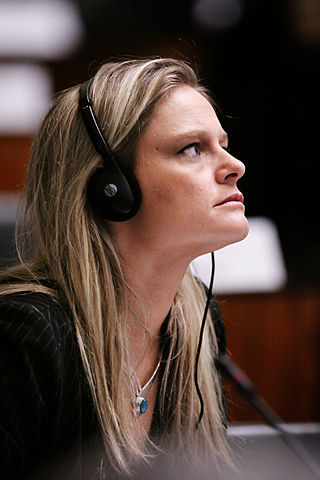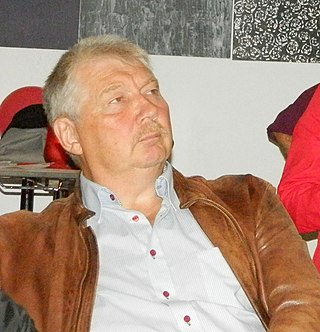Related Research Articles

Suðuroy is the southernmost of the Faroe Islands. The island covers 163.7 square kilometres (63.2 sq mi). In 2018 the population was 4,601. Suðuroy region (sýsla) comprises this island and Lítla Dímun,the next isle northward in the Faroes,which is uninhabited.
Marita Petersen was the first and to date only female Prime Minister of the Faroe Islands and the first female speaker of the Løgting (Parliament). She was elected to the Løgting in 1988 for Javnaðarflokkurin . In January 1993,she was elected to the post of prime minister,which she held until September 1994. Later,she became chairman of the parliament from 1994 to 1995. She was Prime Minister of the Faroe Islands in a very difficult time with economic crisis. Marita Petersen died of cancer in 2001.

Vágur,meaning bay,is a town and municipality on the island of Suðuroy,part of the Faroe Islands.

Vágs Bóltfelag (VB) is a Faroese handball club. It started as a football club,which was founded on 5 June 1905,but later the sport handball became a part of the club. The handball club is based in Vágur in Suðuroy. They play their home matches in the sports hall,Vágshøll on Eiðinum in Vágur. The football club is now known as FC Suðuroy.

Lesbian,gay,bisexual,and transgender (LGBT) rights in the Faroe Islands are relatively similar to that of Denmark. The progress of LGBT rights has been slower,however. While same-sex sexual activity has been legal in the Faroe Islands since the 1930s,same-sex couples never had a right to a registered partnership. In April 2016,the Løgting passed legislation legalizing civil same-sex marriage on the Faroes,recognizing same-sex marriages established in Denmark and abroad and allowing same-sex adoption. This was ratified by the Folketing in April 2017. The law went into effect on 1 July 2017.
Uni Jógvanson Arge is a Faroese journalist,writer,musician,singer and a former international football striker.
Same-sex marriage has been legal in the Faroe Islands since 1 July 2017. Legislation allowing same-sex marriage and adoption by same-sex couples was approved by the Løgting on 29 April 2016. The Danish Parliament approved the necessary legislative adaptations on 25 April 2017,and the law received royal assent on 3 May and went into effect on 1 July 2017.

Pól Thorsteinsson is a retired Faroese football player. He has been spent most of his career in the Faroe Islands,while he had brief stints in Iceland and Denmark. At the end of his career Pól Thorsteinsson played with VB/Sumba,who won the Faroese 1. division;in 2010 they changed their name to FC Suðuroy,and the team will be playing in the best division Vodafonedeildin,but Pól Thorsteinsson decided to end his football career at the end of the 2009 season. He has been capped for the Faroe Islands at senior level.

Bjarni Johansen is a Faroese politician and former goal keeper. He is the current mayor of Vágur Municipality,elected for the Social Democratic Party in November 2020 to the Municipality and became mayor from 1 January 2021. He is former chairman for the Faroese football association FC Suðuroy.

Hallur Hansson is a Faroese professional footballer who plays as a midfielder for KÍ.

Jón Pauli Olsen is a former manager for the Faroe Islands women's national football team. He was also manager for the Faroe Islands Women's U17 national team. Olsen is also a former football player,he mostly played as a forward,but sometimes he played as a midfielder and sometimes as a defender. He is married to SiriðStenberg,who is member of the Faroese parliament (Løgting).

Annika Olsen is a Faroese politician,high school teacher and former swimmer. She was Deputy Prime Minister and Minister of Social Affairs in the Faroe Islands (2011–15) and Minister of Internal Affairs from 2008 to 2011 representing the People's Party. Before that she was a member of the City Council of Tórshavn from 2004 to 2008. Annika Olsen has an MA in Nordic languages and literature with a supplementary subject in religion. She is the daughter of Jákup Olsen,a businessman,former politician and former headmaster of Vágur's School and Marna Olsen,born Holm,a retired teacher.

SiriðStenberg is a Faroese politician. She finished her education as a nurse in 1994 and as a nurse in neonatalalogy in 1998 and as a nurse with special knowledge of children from 0-7. Since 2001 she has worked in the children's health care in Suðuroy. She took leave from this employment shortly after assuming office as a member of the Faroese parliament,the parliament is located in Tórshavn,two hours away by ferry from Suðuroy. From 2006-08 she was head master of the Health School of the Faroe Islands,which is located in Suðuroy. She is married to Jón Pauli Olsen,who was football manager of the Faroese women's national football team and social and health assistant,together they have three children.

Kristina Háfoss is a Faroese economist,lawyer,politician (Tjóðveldi) and former national swimmer for the Faroe Islands. She was Minister of Finance of the Faroe Islands from 2015–2019. She was elected for the Løgting again in 2019,but took leave from 1 February 2021 when she started in her new job as the Secretary-General of the Nordic Council.

Bjørt Samuelsen is a Faroese journalist,master in food science and politician (Republic).
Sonja J. Jógvansdóttir is a Faroese journalist,politician,and establisher and coordinator of Samtak,the Faroese trade union center. Until 2015,she was a member of Social Democratic Party (Javnaðarflokkurin). She is a spokesperson for the rights of homosexual people and their rights in the Faroe Islands and was one of the establishers of LGBT Faroe Islands in 2011.

Hanna Jensen is a Faroese high school teacher and a liberal - conservative politician (Progress).

Kristin Michelsen is a Faroese politician (Self-Government).
Energy in the Faroe Islands is produced primarily from imported fossil fuels,with further contributions from hydro and wind power. Oil products are the main energy source,mainly consumed by fishing vessels and sea transport. Electricity is produced by oil,hydropower and wind farms,mainly by SEV,which is owned by all the municipalities of the Faroe Islands. The Faroe Islands are not connected by power lines with continental Europe,and thus the archipelago cannot import or export electricity.
References
- ↑ Logir.fo, FRÁBOÐAN NR. 63 FRÁ 6. JUNI 2002 FRÁ LØGMANNI UM BÝTI AV MÁLSØKJUM LANDSSTÝRISINS MILLUM LANDSSTÝRISMENNINAR Archived 2005-11-13 at the Wayback Machine
- ↑ "takk.fo - Um átakið". Archived from the original on 9 May 2015. Retrieved 3 September 2015.
- ↑ "portal.fo - Annlis gevst í "Í menniskjum góður tokki"". Archived from the original on 5 January 2016. Retrieved 3 September 2015.
- ↑ "Sonja Jógvansdóttir" (in Faroese). Lagtinget. Archived from the original on 4 January 2016.
- ↑ "vagur.fo". Archived from the original on 25 November 2015. Retrieved 3 September 2015.